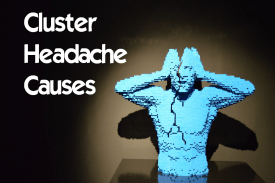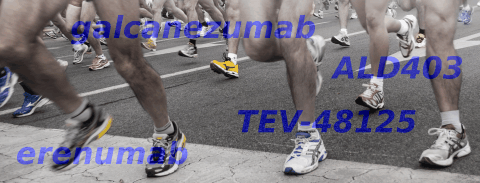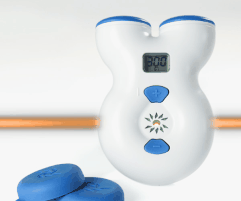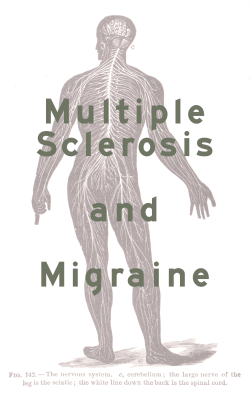Cluster Headaches Causes
As with any type of pain, the agony of this super-intense headache raises the question – what exactly are cluster headaches causes? In other words, why am I in such incredible pain?

But before we get into cluster headaches causes, make sure you understand what cluster is. Here is a handy infographic contrasting migraine with cluster: cluster headache vs migraine
So why does one person get cluster headache attacks, while another person doesn’t?
There has been some research done into the possibility of a genetic cause, or at least genetic factors that contribute. For many years now, researchers have recognized that family members of a cluster patient are more likely to have cluster themselves. In late 2016, a study from Italy was published in the Journal of Headache and Pain, indicating some possible genetic variants that seem to increase a patient’s risk (A genome-wide analysis in cluster headache points to neprilysin and PACAP receptor gene variants.).
Most often when we talk about cluster headaches causes, we end up discussing the brain and nervous system. We know, through modern imagine techniques, that the hypothalamus is involved, as has long been suspected. The trigeminal nerve in the head seems to be important, especially in the process that causes symptoms such as eye pain, tears and congestion. Other possible indirect cluster headache causes are related to a nerve cluster behind the nose (the sphenopalatine ganglion), histamine, and the blood vessels themselves. Read more about these factors here: What is behind the dreaded Cluster Headache?
All that being said, there is still nothing we can point to with certainty. Cluster may indeed be caused by a number of factors working together – for example, even someone who is predisposed genetically may not get cluster because other physical factors are lacking. There are other behavioural factors, such as a history of smoking, which seem to play a role.
But what actually kicks off a cluster headache attack (or, what triggers a cluster period)?
Cluster isn’t as closely connected to “triggers”, such as food or hormonal changes, as migraine is. There are some factors which have been related to periods of cluster headache attacks, including smoking, sleep apnea, and the season of the year (autumn being the highest risk time of year).
Once the cycle has started, there may be other individual cluster headache causes. Alcohol is commonly reported, as well as strong chemical fumes. A hot day, or getting “overheated” during exercise seems to trigger attacks for some. However, when you’re not in a “cluster period”, these things will not trigger attacks at all.
Cluster is hard to research because it is so rare. However, we are learning more and more about the brain, and the last 30 years has brought us incredible advances in understanding. Many of these new revelations about cluster headache causes have brought new treatments to the forefront, such as deep brain stimulation for chronic cluster headache patients.
Further reading: Cluster headaches causes and treatments (Medical News Today)


 Leading the pack at the moment is erenumab, also known as AMG 334. In September, the report said that 70mg of erenumab, delivered by injection, had almost 3 fewer days of migraine attacks per month. These are episodic migraine sufferers who originally had between 4 and 14 migraine days per month. That means that if you could have about 30% fewer attacks, and side effects seem to be few.
Leading the pack at the moment is erenumab, also known as AMG 334. In September, the report said that 70mg of erenumab, delivered by injection, had almost 3 fewer days of migraine attacks per month. These are episodic migraine sufferers who originally had between 4 and 14 migraine days per month. That means that if you could have about 30% fewer attacks, and side effects seem to be few. Now this type of treatment has actually been around for a while. A device is implanted that stimulates the vagus nerve, which runs on two sides of the body from your brain stem through your neck, chest, and abdomen. This type of treatment is used for hard-to-treat cases of epilepsy and depression.
Now this type of treatment has actually been around for a while. A device is implanted that stimulates the vagus nerve, which runs on two sides of the body from your brain stem through your neck, chest, and abdomen. This type of treatment is used for hard-to-treat cases of epilepsy and depression. The fact that cluster headache is extremely rare in children is no comfort to children who get it and their families who are trying to help them. Although
The fact that cluster headache is extremely rare in children is no comfort to children who get it and their families who are trying to help them. Although  The relationship between MS and migraines, and, in fact, MS and headaches in general, is well known. But new research is shedding light on the link between the two.
The relationship between MS and migraines, and, in fact, MS and headaches in general, is well known. But new research is shedding light on the link between the two.